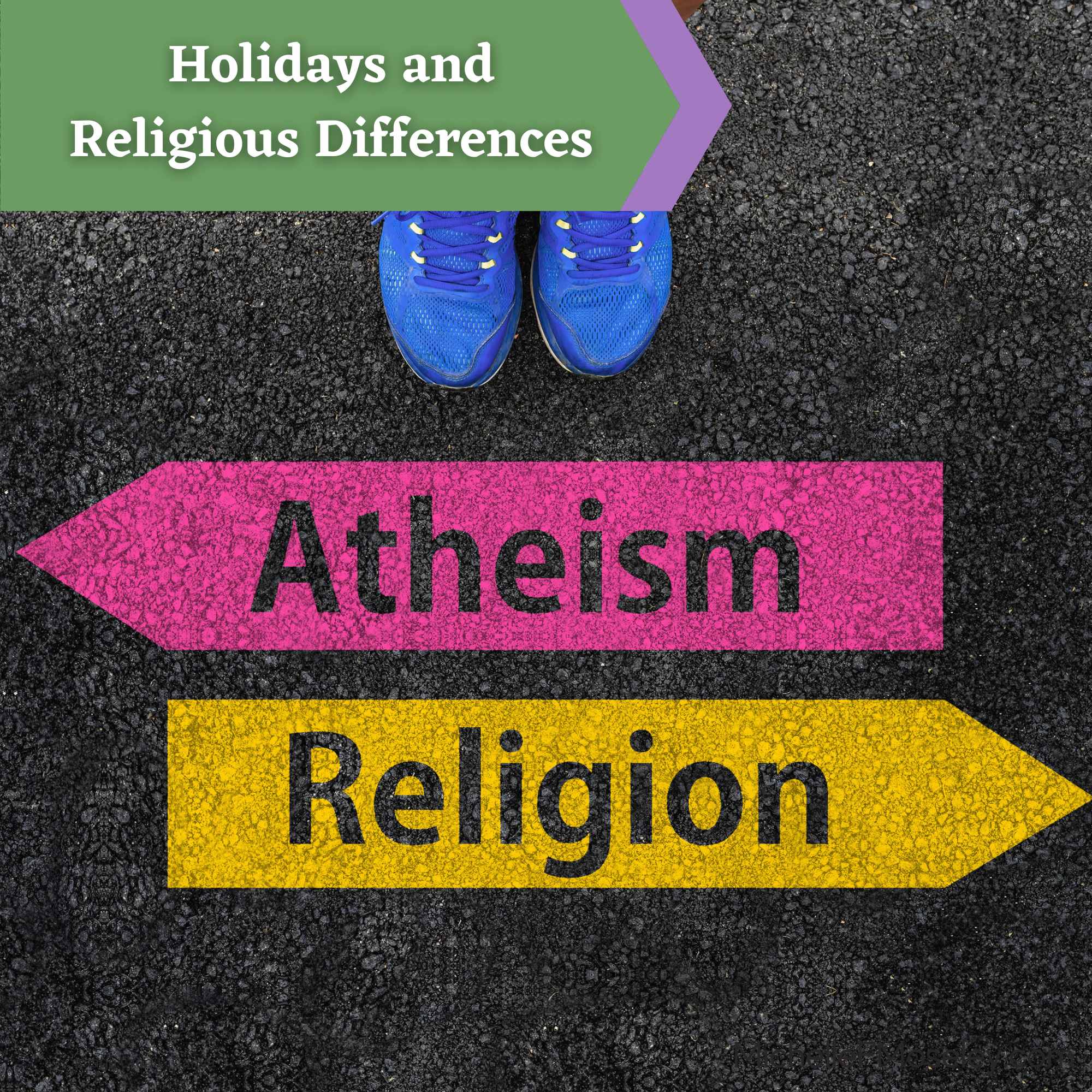Many holidays have some type of religious meaning or undertone. Celebrating can be difficult when there are religious differences between yourself and the friends and/or family you gather with.

Navigating religious differences can be difficult any time you combine extended time together and events that focus on religious beliefs.
This can be especially true for folks who were previously part of high-control Christian groups and are now seeking to celebrate the Christmas season in a way that feels comfortable.
How Religious Differences Impact Holiday Gatherings
CONVERSATIONS. We all hope that it will be simple, even pleasant, to chat with friends or family during a holiday gathering. This is often not the case. Someone may ask, “What church have you been attending?” That uncle who loves a good debate may start talking about how heathens are trying to take over Christmas with their “Happy Holidays rhetoric.” Someone may even corner you to recite all the ways they were ‘blessed by God’ this year, many of which you know are not the full story.
You may long to sit down with the friend or cousin you haven’t seen all year and chat about your jobs. You may feel like you have to be on guard throughout the event, as though you’re not free to show up as your full self and engage with others.
EXPECTATIONS WITH ACTIVITIES. Holiday gatherings can come with all sorts of expectations regarding your involvement in activities. Family may expect you to attend a church service as part of the celebration. Folks may assume everyone is in agreement with praying, and that all in attendance want to offer prayer to the same deity in the same manner. There may be Scripture reading or other traditions that center activities around religious beliefs.
In rare circumstances, the host of a gathering may communicate that involvement in activities is voluntary. It’s even more rare that a gathering may include time to allow for a variety of types of celebration or activity.
IMPOSED VALUES. Personal values can clash when it comes to holidays. This gets even more complex when a host or family member imposes their own values on those in attendance. Imposed values can show up in things like the assumption that all desire to pray before a meal. They can also show up in relation to gift-giving, or even lodging arrangements.
The area of imposed values can be tricky. Some of these things may not be a big deal and are something you’re willing to compromise on for the sake of being with loved ones. For example, you may not believe in prayer, but you feel comfortable having a moment of silence while others pray. Then, there may be values that are completely out of alignment with your own, and are not areas where you are able to compromise.
Coping With Religious Differences During Holidays
CLEARLY COMMUNICATE YOUR BOUNDARIES. Boundaries do not tell other people what they are allowed to do; they do let people know what we’re willing to deal with. You can’t tell Uncle Steve that he’s not allowed to start a political debate over dinner. You can say, “I will not be engaging in a debate over dinner. If that is the conversation, I will remove myself to another location.”
It’s important to identify your boundaries, and to clearly state them to others. Make sure you focus on your needs and how you will handle the situation. You are the only person you can control after all. Be sure not to state a plan of action that you are unwilling or unable to follow through with. For example, saying you’ll remove yourself to another location doesn’t work if there is nowhere else to go or if you don’t have transportation to leave.
Some of the areas where you may want to consider setting boundaries include:
- Conversation Topics: You likely know the ‘hot topics’ that you just don’t want to discuss during the holiday celebration. These may include both religiously-focused topics, as well as things like your dating life or your weight. Take some time to identify those topics that would take away the joy from your experience, and prepare yourself to decline those discussions. You might communicate that before the event. Or you might choose to reply to any comments on the topic with a statement such as, “I’m choosing not to talk about that today.”
- Attendance at a Religious Service: Perhaps attending a religious service is part of your family’s holiday traditions. However, you do not want to attend this year. The choice not to attend is personal preference for some, and is one of the impacts of past religious trauma for others. Remind yourself that you have the right to autonomy in making the decision that is best for you. For some, it may feel best to ‘suck it up’ and attend the service in order to avoid further conflict. Others may feel they need to communicate clearly their intentions to not attend. You may say something like, “I won’t be attending the service this year, but I’ll meet you afterwards for dinner.”
- Time Frame for Involvement: Sometimes the holiday gatherings go off the rails after everyone has had a bit too much togetherness. Before you accept an invitation or show up for an event, consider how long you’re going to stay. Check in with yourself – does time with these people recharge you or drain you? You may decide to set a time limit on how many hours you will be present with others. If you’re traveling, you may choose to stay off-site rather than with family in order to provide an opportunity for some down time. Decisions around time can be especially important for those who are introverts, highly sensitive to surroundings, and/or managing small children.
CREATE NEW TRADITIONS. Just because holidays have always been handled a certain way among your family or friends, doesn’t mean there isn’t room for changes. You can create your own traditions – enjoy a different type of food, find a non-religious event to attend together, play board or video games together. You may even decide that all the hullabaloo around the holiday isn’t for you, and choose not to celebrate at all. You have freedom to choose what works for you!
CONNECT TO SUPPORT FROM OTHERS. Feeling alone while navigating the holidays can be particularly difficult. Connecting with others who are able to support you and offer understanding can make it just a little easier. You may find support through friends who are not particulary religious or who are more accepting of various beliefs. You might find your people via online groups where others are navigating similar struggles. You may also find it beneficial to connect with a therapist to support you along your journey.
I – Michelle – am a licesned mental health counselor in North Carolina. I specialize in working with those who have experienced religious trauma or who are recovering from involvement in high-control religions. I also work with body image concerns, anxiety, grief, and life transitions. I offer a free, 15-minute consult to potential clients so we can determine if we may be a good fit for working together. If you’re located in NC, and think you may benefit from this type of support, you can contact me here.
Michelle F. Moseley is a Licensed Mental Health Counselor in NC. She believes ALL people deserve respect, compassion, and access to mental and physical healthcare. Michelle specializes in working with survivors of religious trauma and with those who have body image concerns, finding there is frequent overlap in these areas. You can learn more about Michelle by visiting her website at MichelleFMoseley.com or following her on Instagram – @therapy_with_michelle


